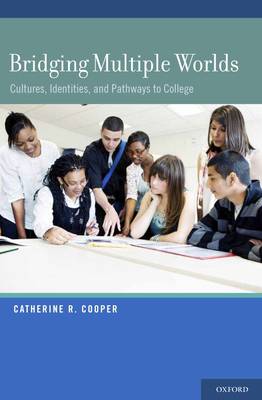
- Afhalen na 1 uur in een winkel met voorraad
- Gratis thuislevering in België vanaf € 30
- Ruim aanbod met 7 miljoen producten
- Afhalen na 1 uur in een winkel met voorraad
- Gratis thuislevering in België vanaf € 30
- Ruim aanbod met 7 miljoen producten
Omschrijving
In every cultural group and in regions worldwide, education is strongly linked to children and adolescents' life opportunities and choices. Many societies embrace the ideals that their children will have equal access to education, and can advance through their merit. However, in many nations, as children move through primary and secondary school towards higher education, the number of immigrant, minority, and low-income youth who finish secondary school and attend college shrinks, signifying a global dilemma.
Drawing on theories and research from across the social sciences, Bridging Multiple Worlds invites readers to compare core viewpoints and ask their own questions about the roots of and remedies for this academic pipeline problem. Considering research, practice, and policies on opening pathways and pipelines, this book provides new quantitative and qualitative evidence to introduce a theory on how youth draw on their cultural worlds to navigate their pathways to college. Chapters address cultural and developmental issues involving academic and cultural identities, and how communities define success for youth. Tools for advancing research with culturally diverse students are also provided. The result is a must-have volume for researchers, educators, policymakers, and students, brimming with fresh and creative syntheses of theory, research, and policy.
"A theoretically rich examination of the development of identity and educational pathways for ethnically diverse youth in American society. This is a book to be savored for its unique perspective on one of the great challenges of our times-finding ways to successfully integrate diverse youth into an increasingly unforgiving educational and social structure."--Patricia Gándara, Ph.D., Professor of Education, UCLA
"Bridging Multiple Worlds is a magnificent book! Its conceptual location on the nexus of research, practice, and policy makes the volume extremely important. Cooper deftly embraces all perspectives, speaks effectively to all, and uses the synergies to great effect. She demonstrates that approaching the work with an expectation for success is both highly engaging for all involved, and increases the likelihood that solutions will be found for inevitable challenges - through effective design and implementation. Cooper has much to teach us, and has provided a clear and comprehensive guide for pursuing effective work to help all students obtain high achievement and college degrees."--Anne C. Petersen, Ph.D., Research Professor, University of Michigan, CHGD Founder and President, Global Philanthropy Alliance
"This volume represents a significant advance to our understanding of the deep socialization and cross-institutional processes that underlie higher education access among members of communities underserved by formal education systems. Its most important contribution is its theory-based overview of concrete collaborative programs and strategies attuned to the unique cultural, linguistic, and social values of participants from diverse backgrounds and life circumstances."--Richard Durán, Ph.D., Gevirtz Graduate School of Education, University of California, Santa Barbara
Specificaties
Betrokkenen
- Auteur(s):
- Uitgeverij:
Inhoud
- Aantal bladzijden:
- 208
- Taal:
- Engels
- Reeks:
Eigenschappen
- Productcode (EAN):
- 9780195080209
- Verschijningsdatum:
- 27/04/2011
- Uitvoering:
- Hardcover
- Formaat:
- Genaaid
- Afmetingen:
- 157 mm x 236 mm
- Gewicht:
- 430 g

Alleen bij Standaard Boekhandel
Beoordelingen
We publiceren alleen reviews die voldoen aan de voorwaarden voor reviews. Bekijk onze voorwaarden voor reviews.











